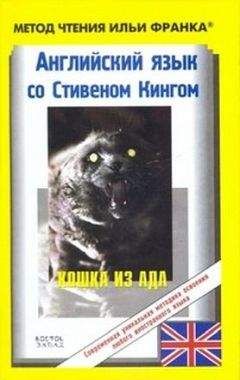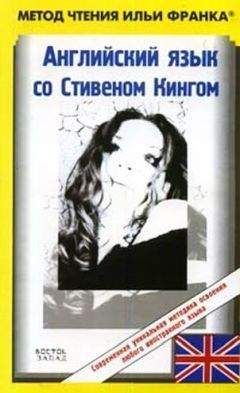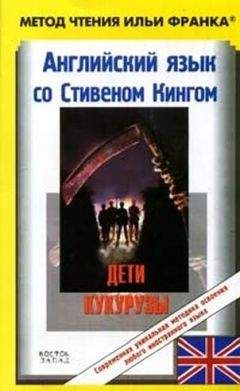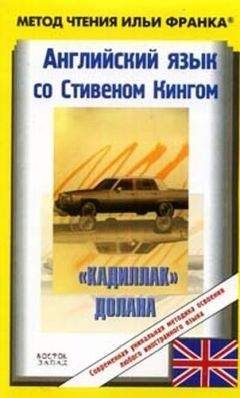Stephen King - Английский язык с С. Кингом "Верхом на пуле"
curious ['kjuqrIqs], exhausted [Ig'zLstId], bargain ['bRgIn]
I breasted a steep hill and stepped back into moonlight again at the top. The trees were gone on my right, replaced by a small country graveyard. The stones gleamed in the pale light. Something small and black was crouched beside one of them, watching me. I took astep closer, curious. The black thing moved and became a woodchuck. It spared me a single reproachful red-eyed glance and was gone into the high grass. All at once I became aware that I was very tired, in fact close to exhausted. I had been running on pure adrenaline since Mrs. McCurdy called five hours before, but now that was gone. That was the bad part. The good part was that the useless sense of frantic urgency left me, at least for the time being. I had made my choice, decided on Ridge Road instead of Route 68, and there was no sense beating myself up over it — fun is fun and done is done, my mother sometimes said. She was full of stuff like that, little Zen aphorisms that almost made sense. Sense or nonsense, this one comforted me now. If she was dead when I got to the hospital, that was that. Probably she wouldn't be. Doctor said it wasn't too bad, according to Mrs. McCurdy; Mrs. McCurdy had also said she was still a young woman. A bit on the heavy side, true, and a heavy smoker in the bargain, but still young.
Meantime, I was out here in the williwags and I was suddenly tired out (между тем я находился здесь, в /этой/ глуши, и внезапно совсем обессилел; williwags — /диал. Нов. Англии/ безлюднаялесистаяместность; глушь; захолустье) — my feet felt as if they had been dipped in cement (мои ноги были словноопущены в цемент; to feel — чувствовать, ощущать).
There was a stone wall running along the road side of the cemetery (со стороны дороги вдоль кладбища шла каменная стена), with a break in it where two ruts ran through (с проломом, через который проходили две колеи). I sat on the wall with my feet planted in one of these ruts (я сел на стену, расположив ноги: «с ногами, расположенными» в одной из этих борозд; plant — растение; to plant — сажать/растения/; всаживать, втыкать; устанавливать). From this position I could see a good length of Ridge Road in both directions (с этого места я мог видеть = просматривать довольно большой участок Ридж-роуд в обоих направлениях; length — длина; расстояние; кусок, отрезок). When I saw headlights coming west (когда я увижу свет от фар, движущийся на запад: «фары, идущие на запад»), in the direction of Lewiston (в направлении Льюистона), I could walk back to the edge of the road and put my thumb out (я смогу снова дойти до края дороги и голосовать: «выставить большой палец»). In the meantime, I'd just sit here with my backpack in my lap (/а/ пока просто посижу здесь, положив рюкзак на колени: «с рюкзаком на коленях»; meantime — времямеждудвумякакими-либособытиямиилидокакого-либособытия; mean — средний) and wait for some strength to come back into my legs (и подожду, пока сила не вернется к ногам).
cemetery ['semItrI], direction [dI'rekS(q)n], [dAI'rekS(q)n], strength [streNT]
Meantime, I was out here in the williwags and I was suddenly tired out — my feet felt as if they had been dipped in cement.
There was a stone wall running along the road side of the cemetery, with a break in it where two ruts ran through. I sat on the wall with my feet planted in one of these ruts. From this position I could see a good length of Ridge Road in both directions. When I saw headlights coming west, in the direction of Lewiston, I could walk back to the edge of the road and put my thumb out. In the meantime, I'd just sit here with my backpack in my lap and wait for some strength to come back into my legs.
A groundmist, fine and glowing, was rising out of the grass (низкий: «земной» туман, легкий и сверкающий, поднимался из травы; fine — тонкий; изящный; мелкий/опыли, песке/; состоящийизмелкихчастиц). The trees surrounding the cemetery on three sides rustled in the rising breeze (деревья, окружающие кладбище с трех сторон, шелестели /листвой/ в поднимающемся ветерке). From beyond the graveyard came the sound of running water and the occasional plunk-plunk of a frog (/откуда-то/ из-за кладбища доносился звук бегущей воды и изредка кваканье лягушки; to plunk — перебирать струны; звенеть /о струне гитары, банджо/; производить любой короткий отчетливый звук). The place was beautiful and oddly soothing (место было красивым и странно успокаивающим), like a picture in a book of romantic poems (как картинка в книге с романтическими стихотворениями).
rustle ['rAsl], occasional [q'keIZqnl], soothe [sHD]
A groundmist, fine and glowing, was rising out of the grass. The trees surrounding the cemetery on three sides rustled in the rising breeze. From beyond the graveyard came the sound of running water and the occasional plunk-plunk of a frog. The place was beautiful and oddly soothing, like a picture in a book of romantic poems.
I looked both ways along the road (я смотрел в обе стороны вдоль дороги). Nothing coming, not so much as a glow on the horizon (ничего не было, даже нет мерцания на горизонте). Putting my pack down in the wheelrut (положив рюкзак в колесную колею) where I'd been dangling my feet (где = вкоторую я свесил ноги), I got up and walked into the cemetery (я встал и пошел на кладбище). A lock of hair had fallen onto my brow (прядь волос упала мне на лоб; brow — бровь; лоб); the wind blew it off (ветер сдул ее; to blow). The mist roiled lazily around my shoes (туман лениво окутывал мои туфли; to roil — мутить, взбалтывать; вздыматься, волноваться/оводе/; клубиться). The stones at the back were old (/могильные/ камни в задней части /кладбища/ были старые); more than a few had fallen over (многие: «больше, чем несколько» повалились). The ones at the front were much newer (камни впереди были намного новее). I bent, hands planted on knees (я наклонился, руки поместив на = упереврукив колени; to bend), to look at one which was surrounded by almost fresh flowers (чтобы посмотреть на один, окруженный почти свежими цветами). By moonlight the name was easy to read (в лунном свете имя легко читалось: «было легко прочитать»): george staub (Джордж Cтауб). Below it were the dates marking the brief span of George Staub's life (ниже него были даты, отмечающие краткую продолжительность /жизни/ Джорджа Стауба; span — промежутоквремени; времяжизни): January 19, 1977, at one end, October 12, 1998, at the other (19 января 1977 /года/ на одной стороне, 12 октября 1998 на другой). That explained the flowers which had only begun to wilt (это объясняло цветы, которые только начали вянуть; to begin); October 12th was two days ago and 1998 was just two years ago (12 октября было два дня назад, а 1998 год был лишь два года назад). George's friends and relatives had stopped by to pay their respects (друзья и родственники Джорджа приходили сюда, чтобы почтить его память; to stop by — stop by — ненадолгоприйти, зайти; to pay respects — выразить/кому-либо/ своеуважение/посетивего/). Below the name and dates was something else, a brief inscription (под именем и датами было что-то еще, краткая надпись). I leaned down farther to read it (я наклонился дальше = ниже, чтобы прочесть ее) and stumbled back, terrified and all too aware that I was by myself, visiting a graveyard by moonlight (и отпрянул назад, в ужасе, слишком сознавая = внезапнослишкомхорошоосознав, что я был один на кладбище при лунном свете; to stumble — спотыкаться; идтиспотыкаясь; ковылять).
inscription [In'skrIpS(q)n], relative ['relqtIv], graveyard ['greIvjRd]
I looked both ways along the road. Nothing coming, not so much as a glow on the horizon. Putting my pack down in the wheelrut where I'd been dangling my feet, I got up and walked into the cemetery. A lock of hair had fallen onto my brow; the wind blew it off. The mist roiled lazily around my shoes. The stones at the back were old; more than a few had fallen over. The ones at the front were much newer. I bent, hands planted on knees, to look at one which was surrounded by almost fresh flowers. By moonlight the name was easy to read: george staub. Below it were the dates marking the brief span of George Staub's life: January 19, 1977, at one end, October 12, 1998, at the other. That explained the flowers which had only begun to wilt; October 12th was two days ago and 1998 was just two years ago. George's friends and relatives had stopped by to pay their respects. Below the name and dates was something else, a brief inscription. I leaned down farther to read it and stumbled back, terrified and all too aware that I was by myself, visiting a graveyard by moonlight.
FUN IS FUN AND DONE IS DONE was the inscription (“что весело, то весело, а что кончено, то кончено”, — гласила надпись).
My mother was dead (моя мать была мертва), had died perhaps at that very minute (умерла, возможно, в эту самую минуту), and something had sent me a message (и что-то отправило мне послание; to send). Something with a thoroughly unpleasant sense of humor (что-то с совершенно неприятным чувством юмора).




